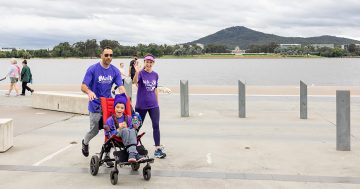
Audrey’s parents say they initially mistook her seizures for play. Photo: Supplied.
The Burke family can see light at the end of the tunnel after a terrifying five months of uncertainty following their eight-year-old daughter Audrey’s epilepsy diagnosis.
With the Walk for Epilepsy event fast approaching, the family is sharing its story in the hope of increasing awareness of the condition and to help support Epilepsy ACT.
Audrey’s mother, Rebecca, a sufferer of epilepsy herself when she was younger, says her daughter’s diagnosis was still a shock.
Audrey’s epilepsy began to show through myoclonic seizures, which consist of sudden body and limb jerks and noises, which, due to her age, her parents just attributed to her being a little silly. It wasn’t until Audrey’s sister, Ava, started to mention her having those moments more regularly that they started to realise something bigger was going on and they went straight to the hospital.
Audrey’s father, Ray, says one time he thought she was having a tantrum.
“I just didn’t know that these moments could be a type of seizure,” he says. “As a parent, it’s very confronting to look back and realise there was something else happening.”
At the hospital, Rebecca was handed an Epilepsy ACT pack prompting a call to Epilepsy ACT.
“It was one of the best things we could have done,” she says. “They have been great.”

Epilepsy ACT chief executive officer Fiona Allardyce. Photo: Supplied.
“They answered all our questions and helped us to discuss what was happening with our other children. They were especially helpful with engaging the school, doing class talks with the students, and training the teachers and school staff on what to do if Audrey was to have a seizure.”
Epilepsy ACT chief executive officer Fiona Allardyce says many schools don’t realise that one in 200 students have epilepsy.
“When a child has a seizure at school, it can be a scary experience for the child, the other students, and even the teachers if they don’t know how to recognise it and know what to do,” she says.
“Sadly, there is still stigma surrounding epilepsy with some parents, and teachers fear the disclosing of a diagnosis. This creates a dangerous situation as epilepsy is ranked in the top five causes of avoidable death in the five to 29 age group.”
Fiona says schools can overcome this fear of discrimination by proactively becoming an Epilepsy Smart School, giving students and teachers with epilepsy the confidence to be open about how to help them in the event of a seizure.
“We encourage schools to visit our website for more information on how they can become an accredited Epilepsy Smart School,” she says.
Audrey’s school has now become an Epilepsy Smart School, giving her parents peace of mind when taking the first steps towards returning her to a normal way of life.
“As a father, you get very protective,” says Ray. “At the worst of it, some of her episodes would see 16 seizures at a time and I would have to physically hold her to prevent her from hurting herself. I was hesitant to let her go back to things such as swimming and dancing if I wasn’t there.

The Burke family says Epilepsy ACT’s ‘Epilepsy Smart School’ training gave them confidence when it came time for Audrey to return to school. Photo: Supplied.
“The school was very good. They completed Epilepsy ACT’s Epilepsy Smart School training, which gave us confidence when it came time for Audrey to return to school.”
Audrey says once when she did have a seizure at school, her teachers and friends knew exactly what to do.
“They brought pillows out for me and I got to sit with a friend,” she says.
Epilepsy ACT says there is a need for greater community awareness in order to reduce the stigma surrounding epilepsy, and to allow people living with the condition to feel more comfortable talking to their friends, family and co-workers about it.
“The more educated conversations we start having about epilepsy, the more we can dispel misconceptions and reduce the number of unnecessary deaths that result from undiagnosed and untreated epilepsy,” says Fiona.
Epilepsy ACT will be holding Walk for Epilepsy on Sunday, 7 March, at Lake Burley Griffin. Registration will open at 9:15 am on the day and the walk will commence at 10 am.
The walk is open to everyone to come along, and the course is fully accessible for mobility scooters, wheelchairs and prams.
For more information or to register, visit Epilepsy ACT.
For more information on the Epilepsy Smart School program, visit here.















